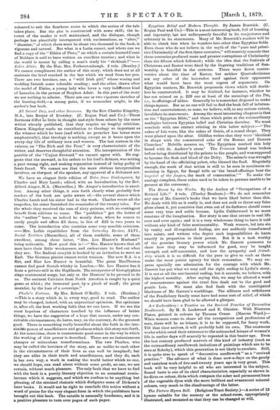AU Saints' Day, and other Sermons. By the Rev. Charles
Kingsley, M.A., late Rector of Eversley. (C. Kegau Paul and Co.)—These Sermons differ 'so little in thought and style from others by the same writer already published, that they require no lengthy criticism. Canon Kingsley made no contribution to theology so important as the witness which be bore (and which no preacher has borne more emphatically), that theology is nothing, except as it bears upon the every-day life of ordinary men and women. The last sermon in the volume, on "The Rich and the Poor," is very characteristic of the writer, and deserves thoughtful attention. His interpretation of the parable of the "Unjust Steward" we cannot agree with. He sug- gests that the steward, in his orders to his lord's debtors, was setting a past wrong right, and making reparation instead of being guilty of fresh fraud. We cannot see that the more obvious interpretation involves, on therpart of the speaker, any approval of a dishonest act.
We have an elegant little edition of Tales front Shakespeare, by Charles and Mary Lamb ; edited, with an Introduction, by the Rev. Alfred Ainger, M.A. (Macmillan.) Mr. Ainger's introduction is excel- lent. Among other things, it sets forth clearly what probably few readers of the book are quite aware of,—the several shares which Charles Lamb and his sister had in the work. Charles wrote all the tragedies, his sister furnished the remainder of the twenty tales. For the whole they received the sum of sixty guineas, with no contingent benefit from editions to come. The " publisher " got the better of the " author " here, as indeed he mostly does, when he comes to needy people and offers £5 down, in lien of 225 in two years to come. The introduction also contains some very sensible criticism. —Mrs. Loftie republishes from the Saturday Review, XLVI., Social Twitters (Macmillan),- all of them readable, some of them excellent, among these latter, "Mrs. Leo Hunter's Husband" being noticeable. How good this is !—" Mrs. Hunter knows that all men have their little weaknesses, and endeavours to find out what they are. The Radical essayist is hooked by an invitation to meet an Earl. The German pianist cannot resist venison. The new R.A. is a flirt, and Miss Leo Hunter is beautiful. The great MacPherson cannot find good Scotch whisky in London,—Mr. Leo Hunter has it from a private still in the Highlands. The interpreter of hieroglyphics sings sentimental songs, but only at the Hunters' is he pressed to do so. The eminent Calvinist from North America is caught by a quiet game at whist ; the immortal poet, by a pinch of snuff; the groat moralist, by the loan of a sovereign."


































 Previous page
Previous page